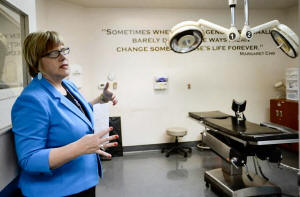|
Texas abortion provider says fetal tissue
burial rule is 'offensive'
 Send a link to a friend
Send a link to a friend
 [January 04, 2017]
By Jon Herskovitz [January 04, 2017]
By Jon Herskovitz
AUSTIN, Texas (Reuters) - The president of
an abortion provider told a federal court on Tuesday a proposed Texas
regulation requiring facilities to dispose of aborted fetal tissue
through burial or cremation is unnecessary and "offensive."
Women's health providers, which provide abortions, among other services,
argue the rules are part of a nationwide agenda to place restrictions on
abortions and make it harder for women to get the procedure. But
officials in Texas have argued it would afford dignity to the tissue.
Texas is the most populous state in the country with a
Republican-dominated government and viewed as a powerful force in
shaping the U.S. conservative political agenda.
"I find the interference by the government into women's personal health
decisions to be morally offensive," Amy Hagstrom Miller, a plaintiff and
president of Whole Woman's Health, which runs three facilities in Texas,
told U.S. District Court Judge Sam Sparks in Austin.
She said it would require the tissue to be treated differently than
other human tissue, increase costs and require the fetal tissue to be
buried whether or not the woman wants it.

Sparks, who last month put the regulation on hold before it was to take
effect on Dec. 19, also issued a temporary restraining order then to
delay enactment until at least Jan. 6.
Reverend Debra Haffner, called as a witness for Whole Woman's Health,
said the regulation enshrines into law one particular religious view on
fetal tissue disposal when there is a diversity of religious views on
the matter.
The Texas limitations would be more stringent than regulations in almost
every other state, which allow aborted fetal tissue to be disposed of
the same as other human tissue, according to the Guttmacher Institute,
an abortion rights group.
[to top of second column] |

Whole Woman's Health founder Amy Hagstrom Miller speaks to members
of the media during a media tour of the Whole Woman’s Health clinic
in San Antonio, Texas, in this file photo taken February 9, 2016.
REUTERS/Darren Abate

Craig Warner, a Texas Attorney General's office lawyer, told the
court "there is no language on individual cremations or individual
burials" in the regulation. He also said the measure would not
greatly add to costs.
During his questioning of Warner, Sparks said the measure appeared
to offer "more respect" to fetal tissue than other tissue yielded
from the reproductive process.
Anti-abortion Republicans proposed new restrictions in several
states after the U.S. Supreme Court struck down some Texas
regulations in June.
The Supreme Court said provisions of the Texas law requiring
abortion doctors to have difficult-to-obtain "admitting privileges"
at local hospitals and requiring clinics to have costly
hospital-grade facilities violated a woman's right to an abortion.
(Editing by Jeffrey Benkoe and Dan Grebler)
[© 2017 Thomson Reuters. All rights
reserved.]
Copyright 2017 Reuters. All rights reserved. This material may not be published,
broadcast, rewritten or redistributed.
 |